|
|
|
Sort Order |
|
|
|
Items / Page
|
|
|
|
|
|
|
| Srl | Item |
| 1 |
ID:
123118
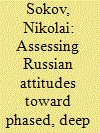

|
|
|
|
|
| Publication |
2013.
|
| Summary/Abstract |
As the United States and Russia contemplate the next stage of nuclear arms reductions beyond the 2010 New Strategic Arms Reduction Treaty, another issue enters the agenda-that of the impact of possible deep reductions on the shape of the global nuclear balance. As the gap between the US/Russian arsenals and the arsenals of "second-tier" nuclear weapon states narrows, the familiar shape of the global balance, which remains, to a large extent, bipolar, is likely to change. The article explores the Russian approach to the relationship between further US-Russian reductions and the prospect of "nuclear multipolarity," and assesses the relative weight of this issue in Russian arms control policy as well as the views on the two specific regional balances-the one in Europe (including UK and French nuclear weapons) and in Asia (the possible dynamic of the Russian-Chinese nuclear balance).
|
|
|
|
|
|
|
|
|
|
|
|
|
|
|
|
| 2 |
ID:
166086
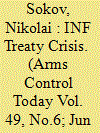

|
|
|
|
|
| Summary/Abstract |
The pending demise of the Intermediate-Range Nuclear Forces (INF) Treaty indicates the larger deterioration of the U.S.-Russian arms control relationship. The chances that the parties will resolve their disagreements are extremely low or, more realistically, nonexistent.
|
|
|
|
|
|
|
|
|
|
|
|
|
|
|
|
| 3 |
ID:
077791
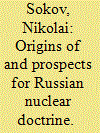

|
|
|
|
|
| Publication |
2007.
|
| Summary/Abstract |
This article explores Russia's increasing reliance on nuclear weapons from three perspectives. First, it seeks to demonstrate that the phenomenon is not exclusively limited to Russia and represents a broader trend, which is ultimately rooted in the nature of the contemporary international system or, more precisely, the uncertainties of the transitional period between the Cold War system and a new emerging one. Second, it analyzes the role assigned to nuclear weapons in Russia's doctrinal documents, in particular the emergence of a new mission - limited-use of nuclear weapons to deter or, if deterrence fails, to de-escalate large-scale conventional conflicts. Discussions of the new doctrine, which have begun recently, suggest that this new mission will likely remain unchanged. Finally, this article looks at the apparent discrepancy between Russia's nuclear modernization programs and the roles assigned to nuclear weapons in the military doctrine, as well as the causes of that discrepancy
|
|
|
|
|
|
|
|
|
|
|
|
|
|
|
|
| 4 |
ID:
095994
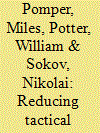

|
|
|
|
|
| Publication |
2010.
|
| Summary/Abstract |
US and Russian leaders have indicated that the next round of US-Russian strategic arms negotiations, after a START follow-on treaty is agreed and ratified, is likely to tackle non-strategic, or 'tactical', nuclear weapons. Control of such weapons has remained elusive, despite the fact that they are particularly attractive to terrorists and present a greater risk than strategic weapons of early or accidental use. In 1991, US President George H.W. Bush and Soviet President Mikhail Gorbachev made parallel, but unilateral, pledges - collectively known as the presidential nuclear initiatives - to reduce the numbers of their tactical nuclear weapons and store the larger part of their arsenals in central storage (which was not defined). Washington, however, did not accept a Soviet proposal made that autumn to negotiate a legally binding, verifiable treaty. The two countries have made much progress towards meeting their initiative commitments, but there have been no further serious negotiations on the issue despite many rounds of strategic arms reduction talks. The intention of US and Russian officials to finally tackle the issue of tactical nuclear weapons is welcome, yet linking the two classes of nuclear weapons at an early stage in the next round of post-START negotiations might result in more problems than it can solve.
|
|
|
|
|
|
|
|
|
|
|
|
|
|
|
|
| 5 |
ID:
054879
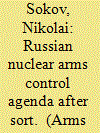

|
|
|
| 6 |
ID:
076776
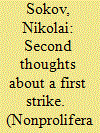

|
|
|
|
|
| Publication |
2007.
|
| Summary/Abstract |
This article critiques recent articles in Foreign Affairs and International Security that argue that in the foreseeable future the United States could acquire an assured first-strike capability vis-à-vis Russia and China thanks to technological improvements in U.S. nuclear delivery systems and a general decline in the numbers and capabilities of Russian nuclear forces. Notwithstanding these articles, this analysis finds that mutual deterrence will persist regardless of the scale of possible future imbalances because deterrence is a highly flexible phenomenon. The pertinent question is not whether the United States will be able, in a surprise first strike, to cripple severely Russian response capabilities, but whether political stakes in any foreseeable conflict could justify the risk of even a small retaliatory strike on the United States. This article also assesses whether the Foreign Affairs and International Security articles could inadvertently exacerbate an already highly charged anti-American sentiment in Russia, possibly laying the foundation for a revitalization and expansion of the Russian nuclear arsenal.
|
|
|
|
|
|
|
|
|
|
|
|
|
|
|
|
| 7 |
ID:
047712
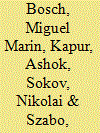

|
|
|
|
|
| Publication |
New York, United Nations, 1999.
|
| Description |
vi, 38p.
|
|
|
|
|
|
|
|
|
|
|
|
Copies: C:1/I:0,R:0,Q:0
Circulation
| Accession# | Call# | Current Location | Status | Policy | Location |
| 043849 | 355.825119/BOS 043849 | Main | On Shelf | General | |
|
|
|
|
| 8 |
ID:
047713
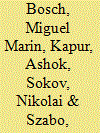

|
|
|
|
|
| Publication |
New York, United States, 1999.
|
| Description |
vi, 38p.
|
|
|
|
|
|
|
|
|
|
|
|
Copies: C:1/I:0,R:0,Q:0
Circulation
| Accession# | Call# | Current Location | Status | Policy | Location |
| 043781 | 355.825119/BOS 043781 | Main | On Shelf | General | |
|
|
|
|
| 9 |
ID:
054406
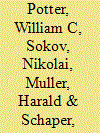

|
|
|
|
|
| Publication |
Geneva, UNIDIR, 2000.
|
| Description |
viii, 84p.
|
| Standard Number |
929045136X
|
|
|
|
|
|
|
|
|
|
|
|
Copies: C:1/I:0,R:0,Q:0
Circulation
| Accession# | Call# | Current Location | Status | Policy | Location |
| 044207 | 355.825119/POT 044207 | Main | On Shelf | General | |
|
|
|
|
| 10 |
ID:
054531
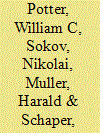

|
|
|
|
|
| Publication |
Geneva, UNIDIR, 2000.
|
| Description |
viii, 84p.
|
| Series |
UNIDIR/2000/20
|
|
|
|
|
|
|
|
|
|
|
|
Copies: C:1/I:0,R:0,Q:0
Circulation
| Accession# | Call# | Current Location | Status | Policy | Location |
| 044299 | 355.825119/POT 044299 | Main | On Shelf | General | |
|
|
|
|
|
|
|
|
|